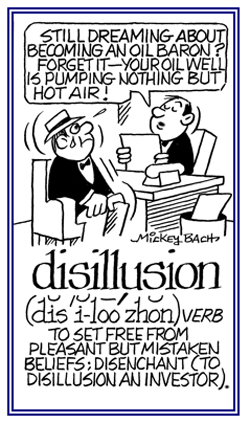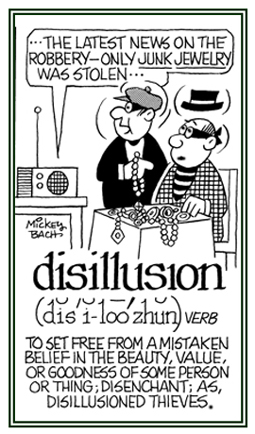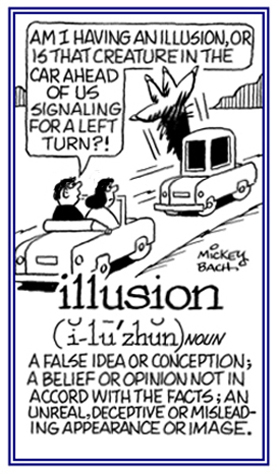lud-, ludi-, lus-
(Latin: play, make sport of, jest; sportive; pastime)
A condition, or fact, of being disenchanted, disappointed, or realizing that one's belief is not true: After experiencing the disillusion about Josh being in love with her, Therese decided she had to have no further contact with him.
disillusion (verb), disillusions; disillusioned; disillusioning
To cause someone to realize that an ideal is false or an idea is mistaken: After reading the headlines in the newspaper, Stan felt that he had been disillusioned in his belief that the new mayor would improve the economic problems of the city.

© ALL rights are reserved.

© ALL rights are reserved.

© ALL rights are reserved.
Go to this Word A Day Revisited Index



Go to this Word A Day Revisited Index
so you can see more of Mickey Bach's cartoons.
disillusive (adjective), more disillusive, most disillusive
A reference to being freed from a wrong impression or a false conception: Glenda's disillusive mood in the morning made her feel as if she were relieved of her sorrows and confusion.
elude (i LOOD) (verb), eludes; eluded; eluding
1. To avoid, escape from, dodge, get away from, evade as by daring, cleverness, or skill: The burglar eluded the police by hiding in a dumpster and he continued to elude the police until he was able to sneak out and go home.
2. To escape the understanding or comprehension of: The new neighbor's family name is eluding Willie; so, he can't tell his wife who they are.
3. Escaping by dexterity or stratagem; such as, a blow, an attack, a danger, or a difficulty: By running down the alley, the bank robber thought he was successfully eluding the police.
4. Evading compliance with, or fulfillment of, a law, an order, a demand, a request, an obligation, etc.: The publishing baron, Mr. Maxwell, hoped he was eluding the tax collectors by moving to a different country.
5. Slipping away from, escaping adroitly from a person's grasp or pursuit; literally, and figuratively; evading (curiosity, vigilance, etc.): Whenever possible, the famous actress eluded the photographers when she left home.
6. Etymology: from Latin eludere, "to escape from, to make a fool of"; from ex- "out, away" + ludere, "to play".
2. To escape the understanding or comprehension of: The new neighbor's family name is eluding Willie; so, he can't tell his wife who they are.
3. Escaping by dexterity or stratagem; such as, a blow, an attack, a danger, or a difficulty: By running down the alley, the bank robber thought he was successfully eluding the police.
4. Evading compliance with, or fulfillment of, a law, an order, a demand, a request, an obligation, etc.: The publishing baron, Mr. Maxwell, hoped he was eluding the tax collectors by moving to a different country.
5. Slipping away from, escaping adroitly from a person's grasp or pursuit; literally, and figuratively; evading (curiosity, vigilance, etc.): Whenever possible, the famous actress eluded the photographers when she left home.
6. Etymology: from Latin eludere, "to escape from, to make a fool of"; from ex- "out, away" + ludere, "to play".
A person who seeks to avoid accountability or capture by using stealth or trickery: Rene's reputation in prison was that he was one of the great eluders of bank robberies; that is, until he got caught by the police and was sentenced to prison.
1. The action of escaping cleverly from danger, pursuit, etc.: One of Mike's favorite cartoon characters, Hein, practiced elusion at work by hiding from his boss to take a nap.
2. An instance of escaping someone or something with deception: The embezzlers, Tim and Jim, celebrated their elusion of the police a little too soon, because they were caught the next day.
2. An instance of escaping someone or something with deception: The embezzlers, Tim and Jim, celebrated their elusion of the police a little too soon, because they were caught the next day.
elusive (adjective), more elusive, most elusive
1. Tending to avoid perception or comprehension; including being difficult to understand, define, or to identify: The students found the solutions to some of the math problems very elusive until the teacher explained the numerical process that made it easier to solve them.
2. Referring to being hard to find or to capture: The cat was very elusive because it was hiding in the bushes during the day and came out only at night.
2. Referring to being hard to find or to capture: The cat was very elusive because it was hiding in the bushes during the day and came out only at night.
elusively (adverb), more elusively, most elusively
Characterized by being difficult to describe, to find, to achieve, or to remember: In her attempts to create a criminal profile, the psychologist, Mrs. Renaldo, was elusively challenged to capture his exact personality.
elusory (adjective), more elusory, most elusory
1. The nature of an evasion or subterfuge: During the police interview, the suspect gave the most elusory answers to even the most basic questions.
2. As an object of thought; slipping from the grasp; misleading; fallacious; deceitful; that which one cannot "get hold of": Sharon had an elusory memory of happy days when she was in elementary school.
2. As an object of thought; slipping from the grasp; misleading; fallacious; deceitful; that which one cannot "get hold of": Sharon had an elusory memory of happy days when she was in elementary school.
illude (verb), illudes; illuded; illuding
1. To trick, impose upon, to deceive with false hopes: Elva felt that the sales clerk was trying to illude her into buying beauty products with promises of a more romantic life.
2. To play upon with deception; to excite and to disappoint the hopes of something: After dancing with the prince twice, Harriet, the actress, was illuded into believing that he would marry her.
3.To disappoint the hopes of: Any increase in salary will simply illude the staff where Sam works because of the economic slowdown.
2. To play upon with deception; to excite and to disappoint the hopes of something: After dancing with the prince twice, Harriet, the actress, was illuded into believing that he would marry her.
3.To disappoint the hopes of: Any increase in salary will simply illude the staff where Sam works because of the economic slowdown.
Someone who is a deceiver or who disappoints the hopes of: Wright, the salesman, who was an illuder of lonely women, left town before the police could catch him.
1. A deception; a false, although often pleasant, notion; a misconception: The illusions of youth fade with maturity.
2. Semblance, a misleading visual impression; hallucination, false image: Mirrors give an illusion of more space in a room.
3. An imaginary appearance of something that seems to be real or which seems to exist: While he was sleeping, Sam had the illusion in his dream that he was a muscle man at a fitness studio and was so strong that the exercise equipment was breaking apart as he used each one.
4. The fact or condition of being deceived or fooled by appearances: A handsome face can be an illusion which disguises a mean personality.
5. A mental state involving the attribution of reality to what is unreal: Norbert was under the illusion that he was living in a castle as a king.

© ALL rights are reserved.
Go to this Word A Day Revisited Index
2. Semblance, a misleading visual impression; hallucination, false image: Mirrors give an illusion of more space in a room.
3. An imaginary appearance of something that seems to be real or which seems to exist: While he was sleeping, Sam had the illusion in his dream that he was a muscle man at a fitness studio and was so strong that the exercise equipment was breaking apart as he used each one.
4. The fact or condition of being deceived or fooled by appearances: A handsome face can be an illusion which disguises a mean personality.
5. A mental state involving the attribution of reality to what is unreal: Norbert was under the illusion that he was living in a castle as a king.
Troy had the illusion that his girlfriend was floating above his bed!
6. Etymology: "act of deception", from Old French illusion, "a mocking"; from Latin illusionem, illusio, "a mocking, a jesting, an irony"; from illudere, "to mock at"; literally, "to play with", from in-, "at" + ludere, "to play".A pleasant illusion is better than a harsh reality.

Go to this Word A Day Revisited Index
so you can see more of Mickey Bach's cartoons.
illusionary (adjective), more illusionary, most illusionary
Characterized by or pertaining to something that seems to be true or real; however it is false or unreal: The illusionary image the hikers had was of a lake just on the horizon, when in fact it was a misconception.
1. The use of clever artistic techniques to disguise or mask the reality of what the artist is trying to portray: The art master, Mr. Brush, taught his students that the use of illusionism was essential in creating still life portraits.
2. The use of devices and techniques in art or decoration to present a concept that is beyond reality: Some good paintings produce illusionisms of a third dimension.
2. The use of devices and techniques in art or decoration to present a concept that is beyond reality: Some good paintings produce illusionisms of a third dimension.
Someone who produces mental images that are not real: A conjuror or sleight of hand performer is identified as an illusionist.

© ALL rights are reserved.
Go to this Word A Day Revisited Index



